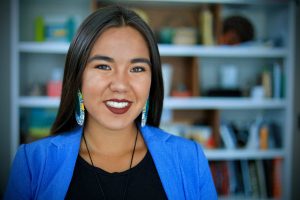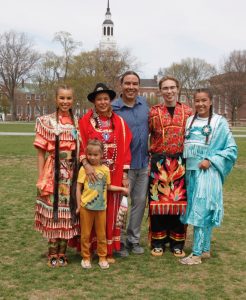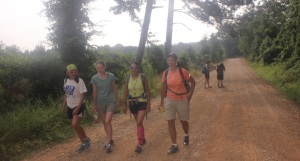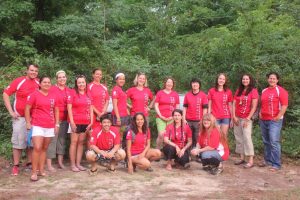For Alayah, public health has always been an interest even when she was unsure of which path she would take in higher education. Alayah Johnson-Jennings (Choctaw, Quapaw, Sac and Fox, and Miami) is a Masters of Public Health student with a concentration in Health Equity, Social Justice, and Human Rights. She started her journey to public health at the age of 12 when she participated in the pilot project Yappalli, a walk that aimed to promote health in the Choctaw Nation. Choctaw women walked for 2 weeks from the Mississippii and Arkansas border to Tuskahoma, Oklahoma. In Alayah’s words, the goal was not to relive trauma from the Trail of Tears, but to understand the vision that her ancestors had for their futures. Yappalli means “to walk slowly or with reverence,” and the experience, Alayah says, shaped her outlook on life. She was able to present her experience at an international indigenous conference in Australia as well as in different Maori communities in New Zealand, her first steps into the academic world and research. However, initially she didn’t view her experience as research and the one question in her mind that stemmed from it wasn’t concerned with how to eat or be healthy, but “why aren’t we able to eat healthy?”. Alayah says that growing up as an Indigenous person, she has always had the mindset that “whatever you do, you come back and help your community.”
Public health has allowed her to start stepping towards a future career that allows her to continue doing research. She is interested in pursuing either a PhD, an MD, or a JD, and is currently leaning towards an MD or PhD. If she does pursue medicine, she wants to go back to one of her tribal communities and work for them, possibly in an Indian Health Services facility focusing on pediatrics or family medicine. If she pursues a PhD, she would want to continue her research on decolonizing research methods which she focused on in her undergraduate thesis.
Alayah graduated from Dartmouth College with a B.A. in Native American Studies and Sociology with a concentration in Women and Gender Studies. Her thesis was formed through 25 interviews with Indigenous professors in the U.S. and Canada, looking at the barriers and facilitators of Indigenous methods in their work and how they use these methods. She believes that the “system is broken,” because Indigenous professors are being dismissed and overworked, doing work not only for the sphere of academia but work for their own communities. She identifies a big problem in academia that makes no space for Indigenous research when people often say that Native nations are too small to matter in the academic world. She wants to break these narratives and move towards allowing Indigenous methods and knowledge to thrive in academia and in ways that can translate to real work within Indigenous communities that help them. She views academia as a tool to give back either through working for her tribe, writing grants, and turning theory into practice.
Aside from her academics, Alayah comes from a big family of 6 and is the oldest of her 3 siblings. She has two brothers and a sister, as well as two dogs. Her parents are also accomplished academics, with both of her parents having phDs, and who have inspired her to pursue higher education. She also enjoys cooking and links her interest in it to ways that cultural cooking can be used to promote health through food. The American Indian Center is so proud of Alayah, her accomplishments, and wish the best for her future at Carolina and beyond!




